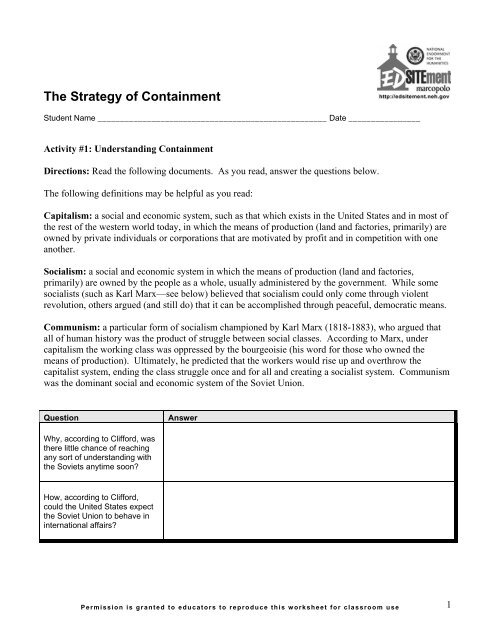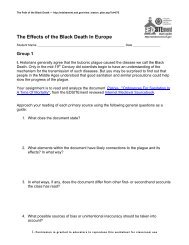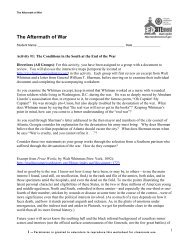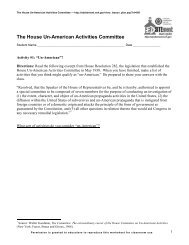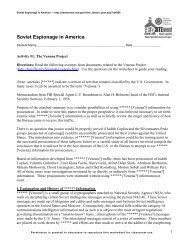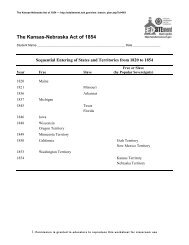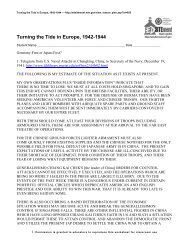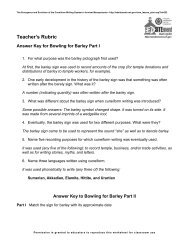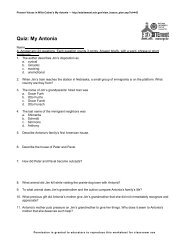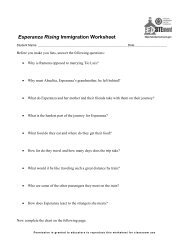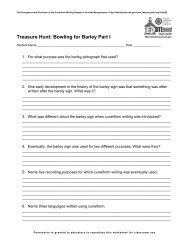available here as a PDF - EDSITEment
available here as a PDF - EDSITEment
available here as a PDF - EDSITEment
You also want an ePaper? Increase the reach of your titles
YUMPU automatically turns print PDFs into web optimized ePapers that Google loves.
The Strategy of Containment<br />
Student Name ___________________________________________________ Date ________________<br />
Activity #1: Understanding Containment<br />
Directions: Read the following documents. As you read, answer the questions below.<br />
The following definitions may be helpful <strong>as</strong> you read:<br />
Capitalism: a social and economic system, such <strong>as</strong> that which exists in the United States and in most of<br />
the rest of the western world today, in which the means of production (land and factories, primarily) are<br />
owned by private individuals or corporations that are motivated by profit and in competition with one<br />
another.<br />
Socialism: a social and economic system in which the means of production (land and factories,<br />
primarily) are owned by the people <strong>as</strong> a whole, usually administered by the government. While some<br />
socialists (such <strong>as</strong> Karl Marx—see below) believed that socialism could only come through violent<br />
revolution, others argued (and still do) that it can be accomplished through peaceful, democratic means.<br />
Communism: a particular form of socialism championed by Karl Marx (1818-1883), who argued that<br />
all of human history w<strong>as</strong> the product of struggle between social cl<strong>as</strong>ses. According to Marx, under<br />
capitalism the working cl<strong>as</strong>s w<strong>as</strong> oppressed by the bourgeoisie (his word for those who owned the<br />
means of production). Ultimately, he predicted that the workers would rise up and overthrow the<br />
capitalist system, ending the cl<strong>as</strong>s struggle once and for all and creating a socialist system. Communism<br />
w<strong>as</strong> the dominant social and economic system of the Soviet Union.<br />
Question<br />
Answer<br />
Why, according to Clifford, w<strong>as</strong><br />
t<strong>here</strong> little chance of reaching<br />
any sort of understanding with<br />
the Soviets anytime soon?<br />
How, according to Clifford,<br />
could the United States expect<br />
the Soviet Union to behave in<br />
international affairs?<br />
Permission is granted to educators to reproduce this worksheet for cl<strong>as</strong>sroom use 1
How, in Clifford’s view, should<br />
the United States respond to<br />
this anticipated Soviet<br />
behavior?<br />
According to Clifford, what<br />
advantage did the Soviet<br />
system of government have<br />
over that of American<br />
democracy? What did this<br />
imply for U.S. foreign policy?<br />
What did Kennan mean by<br />
“containment”? Why did he<br />
think it would work?<br />
Why did Kennan believe that<br />
“threats or blustering” would be<br />
ineffective in stopping Soviet<br />
aggression?<br />
What did Kennan predict might<br />
happen in the Soviet Union if<br />
containment were practiced<br />
consistently?<br />
Memorandum from Clark Clifford to President Truman, “American Relations with the Soviet Union,”<br />
September 24, 1946:<br />
http://www.trumanlibrary.org/whistlestop/study_collections/coldwar/documents/index.php?documentdat<br />
e=1946-09-24&documentid=4-1&studycollectionid=&pagenumber=1<br />
[A successful lawyer in St. Louis, Clark Clifford (1906-1998) w<strong>as</strong> an officer in the U.S. Navy during<br />
World War II. In this capacity he frequently advised President Truman, who came to rely on him to the<br />
extent that he <strong>as</strong>ked Clifford to accompany him to the Potsdam Conference in July 1945. One of his<br />
first <strong>as</strong>signments in this job w<strong>as</strong> to prepare a report analyzing the postwar behavior of the Soviet Union,<br />
and making recommendations <strong>as</strong> to how the United States should respond. The resulting document—an<br />
81-page report entitled “American Relations with the Soviet Union”—would strongly influence U.S.<br />
foreign policy throughout the Cold War.]<br />
The primary objective of United States policy toward the Soviet Union is to convince Soviet leaders that<br />
it is in their interest to participate in a system of world cooperation, that t<strong>here</strong> are no fundamental causes<br />
for war between our two nations, and that the security and prosperity of the Soviet Union, and that of the<br />
rest of the world <strong>as</strong> well, is being jeopardized by aggressive militaristic imperialism such <strong>as</strong> that in<br />
which the Soviet Union is now engaged.<br />
Permission is granted to educators to reproduce this worksheet for cl<strong>as</strong>sroom use 2
However, these same leaders with whom we hope to achieve an understanding on the principles of<br />
international peace appear to believe that a war with the United States and the other leading capitalistic<br />
nations is inevitable. They are incre<strong>as</strong>ing their military power and the sp<strong>here</strong> of Soviet influence in<br />
preparation for the ‘inevitable’ conflict, and they are trying to weaken and subvert their potential<br />
opponents by every means at their disposal. So long <strong>as</strong> these men ad<strong>here</strong> to these beliefs, it is highly<br />
dangerous to conclude that hope of international peace lies only in ‘accord,’ ‘mutual understanding,’ or<br />
‘solidarity’ with the Soviet Union.<br />
Adoption of such a policy would impel the United States to make sacrifices for the sake of Soviet-U.S.<br />
relations, which would only have the effect of raising Soviet hopes and incre<strong>as</strong>ing Soviet demands, and<br />
to ignore alternative lines of policy, which might be much more compatible with our own national and<br />
international interests.<br />
The Soviet Government will never be e<strong>as</strong>y to ‘get along with.’ The American people must accustom<br />
themselves to this thought, not <strong>as</strong> a cause for despair, but <strong>as</strong> a fact to be faced objectively and<br />
courageously. If we find it impossible to enlist Soviet cooperation in the solution of world problems, we<br />
should be prepared to join with the British and other Western countries in an attempt to build up a world<br />
of our own which will pursue its own objectives and will recognize the Soviet orbit <strong>as</strong> a distinct entity<br />
with which conflict is not predestined but with which we cannot pursue common aims.<br />
As long <strong>as</strong> the Soviet Government maintains its present foreign policy, b<strong>as</strong>ed upon the theory of an<br />
ultimate struggle between Communism and Capitalism, the United States must <strong>as</strong>sume that the U.S.S.R.<br />
might fight at any time for the twofold purpose of expanding the territory under communist control and<br />
weakening its potential capitalist opponents. The Soviet Union w<strong>as</strong> able to flow into the political<br />
vacuum of the Balkans, E<strong>as</strong>tern Europe, the Near E<strong>as</strong>t, Manchuria and Korea because no other nation<br />
w<strong>as</strong> both willing and able to prevent it. Soviet leaders were encouraged by e<strong>as</strong>y success and they are<br />
now preparing to take over new are<strong>as</strong> in the same way. The Soviet Union, <strong>as</strong> Stalin euphemistically<br />
phr<strong>as</strong>ed it, is preparing ‘for any eventuality.’<br />
Unless the United States is willing to sacrifice its future security for the sake of ‘accord’ with the<br />
U.S.S.R. now, this government must, <strong>as</strong> a first step toward world stabilization, seek to prevent additional<br />
Soviet aggression. The greater the area controlled by the Soviet Union, the greater the military<br />
requirements of this country will be. Our present military plans are b<strong>as</strong>ed on the <strong>as</strong>sumption that, for the<br />
next few years at le<strong>as</strong>t, Western Europe, the Middle E<strong>as</strong>t, China and Japan will remain outside the<br />
Soviet sp<strong>here</strong>. If the Soviet Union acquires control of one or more of these are<strong>as</strong>, the military forces<br />
required to hold in check those of the U.S.S.R. and prevent still further acquisitions will be substantially<br />
enlarged. That will also be true if any of the naval and air b<strong>as</strong>es in the Atlantic and Pacific, upon which<br />
our present plans rest, are given up. This government should be prepared, while scrupulously avoiding<br />
any act which would be an excuse for the Soviets to begin a war, to resist vigorously and successfully<br />
any efforts of the U.S.S.R. to expand into are<strong>as</strong> vital to American security.<br />
The language of military power is the only language which disciples of power politics [that is, the belief<br />
that only considerations of power—and not of morality—matter in foreign affairs] understand. The<br />
United States must use that language in order that Soviet leaders will realize that our government is<br />
determined to uphold the interests of its citizens and the rights of small nations. Compromise and<br />
concessions are considered, by the Soviets, to be evidences of weakness and they are encouraged by our<br />
‘retreats’ to make new and greater demands.<br />
Permission is granted to educators to reproduce this worksheet for cl<strong>as</strong>sroom use 3
The main deterrent to Soviet attack on the United States, or to attack on are<strong>as</strong> of the world which are<br />
vital to our security, will be the military power of this country. It must be made apparent to the Soviet<br />
Government that our strength will be sufficient to repel any attack and sufficient to defeat the U.S.S.R.<br />
decisively if a war should start. The prospect of defeat is the only sure means of deterring the Soviet<br />
Union....<br />
In addition to maintaining our own strength, the United States should support and <strong>as</strong>sist all democratic<br />
countries which are in any way menaced or endangered by the U.S.S.R. Providing military support in<br />
c<strong>as</strong>e of attack is a l<strong>as</strong>t resort; a more effective barrier to communism is strong economic support. Trade<br />
agreements, loans and technical missions strengthen our ties with friendly nations and are effective<br />
demonstrations that capitalism is at le<strong>as</strong>t the equal of communism....<br />
T<strong>here</strong> are some trouble-spots which will require diligent and considered effort on the part of the United<br />
States if Soviet penetration and eventual domination is to be prevented. In the Far E<strong>as</strong>t, for example,<br />
this country should continue to strive for a unified and economically stable China, a reconstructed and<br />
democratic Japan, and a unified and independent Korea....<br />
Our best chances of influencing Soviet leaders consist in making it unmistakably clear that action<br />
contrary to our conception of a decent world order will rebound to the disadvantage of the Soviet regime<br />
w<strong>here</strong><strong>as</strong> friendly and cooperative action will pay dividends. If this position can be maintained firmly<br />
enough and long enough, the logic of it must permeate eventually into the Soviet system....<br />
Because the Soviet Union is a highly-centralized state, whose leaders exercise rigid discipline and<br />
control of all governmental functions, its government acts with speed, consistency, and boldness.<br />
Democratic governments are usually loosely organized, with a high degree of autonomy in government<br />
departments and agencies. Government policies at times are confused, misunderstood or disregarded by<br />
subordinate officials. The United States cannot afford to be uncertain of its policies toward the Soviet<br />
Union. T<strong>here</strong> must be such effective coordination within the government that our military and civil<br />
policies concerning the U.S.S.R., her satellites, and our Allies are consistent and forceful. Any<br />
uncertainty or discrepancy will be seized immediately by the Soviets and exploited at our cost....<br />
In conclusion, <strong>as</strong> long <strong>as</strong> the Soviet Government ad<strong>here</strong>s to its present policy, the United States should<br />
maintain military forces powerful enough to restrain the Soviet Union and to confine Soviet influence to<br />
its present area. All nations not now within the Soviet sp<strong>here</strong> should be given generous economic<br />
<strong>as</strong>sistance and political support in their opposition to Soviet penetration.... In order to carry out an<br />
effective policy toward the Soviet Union, the United States Government should coordinate its own<br />
activities, inform and instruct the American people about the Soviet Union, and enlist their support<br />
b<strong>as</strong>ed upon knowledge and confidence. These actions by the United States are necessary before we<br />
shall ever be able to achieve understanding and accord with the Soviet Union on any terms other than its<br />
own.<br />
Even though Soviet leaders profess to believe that the conflict between Capitalism and Communism is<br />
irreconcilable and must eventually be resolved by the triumph of the latter, it is our hope that they will<br />
change their minds and work out with us a fair and equitable settlement when they realize that we are<br />
too strong to be beaten and too determined to be frightened.<br />
Excerpts from X (George Kennan), “The Sources of Soviet Conduct,” Foreign Affairs, July 1947:<br />
http://www.foreignaffairs.org/19470701faessay25403/x/the-sources-of-soviet-conduct.html<br />
Permission is granted to educators to reproduce this worksheet for cl<strong>as</strong>sroom use 4
[A native of Milwaukee, Wisconsin, George F. Kennan (1904-2005) graduated from Princeton<br />
University in 1925 and soon t<strong>here</strong>after went to work for the U.S. State Department <strong>as</strong> an expert on<br />
Russia. He spent much of the 1930s attached to the U.S. emb<strong>as</strong>sy in Moscow, w<strong>here</strong> he witnessed<br />
firsthand the internal workings of the Soviet Union, including the show trials in which Stalin condemned<br />
thousands of suspected political opponents to death. This experience convinced Kennan that t<strong>here</strong> w<strong>as</strong><br />
little hope for l<strong>as</strong>ting cooperation between the Soviet Union and the West. In May 1944 he w<strong>as</strong><br />
appointed deputy chief of the U.S. mission in Moscow, w<strong>here</strong> in 1946 he drafted a telegram [see<br />
previous lesson] that laid out his views on why the Soviets were behaving <strong>as</strong> they were. This telegram<br />
proved to be highly influential among many of Truman’s foreign policy advisers, who encouraged him<br />
to publish an article clarifying some of his ide<strong>as</strong>. What follows is a much shortened version of that<br />
article, which appeared in the July 1947 issue of the prestigious journal Foreign Affairs. Because the<br />
author w<strong>as</strong> a prominent official in the State Department, he used a false name (“X”) rather than his<br />
own.]<br />
....[I]t is clear that the main element of any United States policy toward the Soviet Union must be that of<br />
long-term, patient but firm and vigilant containment of Russian expansive tendencies. It is important to<br />
note, however, that such a policy h<strong>as</strong> nothing to do with...threats or blustering or superfluous gestures of<br />
outward "toughness." While the Kremlin is b<strong>as</strong>ically flexible in its reaction to political realities, it is by<br />
no means unamenable [unresponsive] to considerations of prestige. Like almost any other government, it<br />
can be placed by tactless and threatening gestures in a position w<strong>here</strong> it cannot afford to yield even<br />
though this might be dictated by its sense of realism. The Russian leaders are keen judges of human<br />
psychology, and <strong>as</strong> such they are highly conscious that loss of temper and of self-control is never a<br />
source of strength in political affairs. They are quick to exploit such evidences of weakness.…<br />
It is clear that the United States cannot expect in the foreseeable future to enjoy political intimacy with<br />
the Soviet regime. It must continue to regard the Soviet Union <strong>as</strong> a rival, not a partner, in the political<br />
arena. It must continue to expect that Soviet policies will reflect no abstract love of peace and stability,<br />
no real faith in the possibility of a permanent happy coexistence of the Socialist and capitalist worlds,<br />
but rather a cautious, persistent pressure toward the disruption and, weakening of all rival influence and<br />
rival power.<br />
Balanced against this are the facts that Russia, <strong>as</strong> opposed to the western world in general, is still by far<br />
the weaker party, that Soviet policy is highly flexible, and that Soviet society may well contain<br />
deficiencies which will eventually weaken its own total potential. This would of itself warrant the<br />
United States entering with re<strong>as</strong>onable confidence upon a policy of firm containment, designed to<br />
confront the Russians with unalterable counter-force at every point w<strong>here</strong> they show signs of<br />
encroaching upon he interests of a peaceful and stable world.<br />
It would be an exaggeration to say that American behavior un<strong>as</strong>sisted and alone could exercise a power<br />
of life and death over the Communist movement and bring about the early fall of Soviet power in<br />
Russia. But the United States h<strong>as</strong> it in its power to incre<strong>as</strong>e enormously the strains under which Soviet<br />
policy must operate, to force upon the Kremlin a far greater degree of moderation and circumspection<br />
than it h<strong>as</strong> had to observe in recent years, and in this way to promote tendencies which must eventually<br />
find their outlet in either the breakup or the gradual mellowing of Soviet power.<br />
Permission is granted to educators to reproduce this worksheet for cl<strong>as</strong>sroom use 5
The Strategy of Containment<br />
Student Name ___________________________________________________ Date ________________<br />
Activity #2: The Truman Doctrine<br />
Directions (Group #1): Read the following document. When you are finished, your teacher will pair<br />
you with another student for a silent debate on whether the United States should do what Truman<br />
suggests.<br />
Excerpts from Harry S. Truman’s “Truman Doctrine” address, which he delivered to Congress on March<br />
12, 1947:<br />
http://www.trumanlibrary.org/whistlestop/study_collections/doctrine/large/documents/index.php?docum<br />
entdate=1947-03-12&documentid=31&studycollectionid=TDoctrine&pagenumber=1<br />
The gravity of the situation which confronts the world today necessitates my appearance before a joint<br />
session of the Congress. The foreign policy and the national security of this country are involved....<br />
The very existence of the Greek state is today threatened by the terrorist activities of several thousand<br />
armed men, led by Communists, who defy the Government’s authority at a number of points,<br />
particularly along the northern boundaries. A commission appointed by the United Nations Security<br />
Council is at present investigating disturbed conditions in northern Greece and alleged border violations<br />
along the frontier between Greece on the one hand and Albania, Bulgaria and Yugoslavia on the other.<br />
Meanwhile, the Greek Government is unable to cope with the situation. The Greek Army is small and<br />
poorly equipped. It needs supplies and equipment if it is to restore the authority of the Government<br />
throughout Greek territory.<br />
Greece must have <strong>as</strong>sistance if it is to become a self-supporting and self-respecting democracy.<br />
The United States must supply that <strong>as</strong>sistance. We have already extended to Greece certain types of<br />
relief and economic aid but these are inadequate. T<strong>here</strong> is no other country to which democratic Greece<br />
can turn.<br />
No other nation is willing and able to provide the necessary support for a democratic Greek<br />
Government.<br />
The British Government, which h<strong>as</strong> been helping Greece, can give no further financial or economic aid<br />
after March. Great Britain finds itself under the necessity of reducing or liquidating its commitments in<br />
several parts of the world, including Greece.<br />
Permission is granted to educators to reproduce this worksheet for cl<strong>as</strong>sroom use 6
We have considered how the United Nations might <strong>as</strong>sist in this crisis. But the situation is an urgent one<br />
requiring immediate action, and the United Nations and its related organizations are not in a position to<br />
extend help of the kind that is required....<br />
Greece’s neighbor, Turkey, also deserves our attention.<br />
The future of Turkey <strong>as</strong> an independent and economically sound State is clearly no less important to the<br />
freedom-loving peoples of the world than the future of Greece. The circumstances in which Turkey finds<br />
itself today are considerably different from those of Greece. Turkey h<strong>as</strong> been spared the dis<strong>as</strong>ters that<br />
have beset Greece. And during the war, the United States and Great Britain furnished Turkey with<br />
material aid.<br />
Nevertheless, Turkey now needs our support.<br />
Since the war Turkey h<strong>as</strong> sought financial <strong>as</strong>sistance from Great Britain and the United States for the<br />
purpose of effecting that modernization necessary for the maintenance of its national integrity.<br />
That integrity is essential to the preservation of order in the Middle E<strong>as</strong>t.<br />
The British Government h<strong>as</strong> informed us that, owing to its own difficulties, it can no longer extend<br />
financial or economic aid to Turkey.<br />
As in the c<strong>as</strong>e of Greece, if Turkey is to have the <strong>as</strong>sistance it needs, the United States must supply it.<br />
We are the only country able to provide that help.<br />
I am fully aware of the broad implications involved if the United States extends <strong>as</strong>sistance to Greece and<br />
Turkey, and I shall discuss these implications with you at this time.<br />
One of the primary objectives of the foreign policy of the United States is the creation of conditions in<br />
which we and other nations will be able to work out a way of life free from coercion. This w<strong>as</strong> a<br />
fundamental issue in the war with Germany and Japan. Our victory w<strong>as</strong> won over countries which<br />
sought to impose their will, and their way of life, upon other nations.<br />
To ensure the peaceful development of nations, free from coercion, the United States h<strong>as</strong> taken a leading<br />
part in establishing the United Nations. The United Nations is designed to make possible l<strong>as</strong>ting freedom<br />
and independence for all its members. We shall not realize our objectives, however, unless we are<br />
willing to help free people to maintain their free institutions and their national integrity against<br />
aggressive movements that seek to impose upon them totalitarian regimes.<br />
This is no more than a frank recognition that totalitarian regimes imposed on free peoples, by direct or<br />
indirect aggression, undermine the foundations of international peace and hence the security of the<br />
United States.<br />
The peoples of a number of countries of the world have recently had totalitarian regimes forced upon<br />
them against their will. The Government of the United States h<strong>as</strong> made frequent protests against<br />
coercion and intimidation in violation of the Yalta agreement, in Poland, Rumania, and Bulgaria. I must<br />
also state that in a number of other countries t<strong>here</strong> have been similar developments.<br />
Permission is granted to educators to reproduce this worksheet for cl<strong>as</strong>sroom use 7
At the present moment in world history nearly every nation must choose between alternative ways of<br />
life. The choice is too often not a free one.<br />
One way of life is b<strong>as</strong>ed upon the will of the majority, and is distinguished by free institutions,<br />
representative government, free elections, guarantees of individual liberty, freedom of speech and<br />
religion, and freedom from political oppression.<br />
The second way of life is b<strong>as</strong>ed upon the will of a minority forcibly imposed upon the majority. It relies<br />
upon terror and oppression, a controlled press and radio, fixed elections, and the suppression of personal<br />
freedoms.<br />
I believe that it must be the policy of the United States to support free peoples who are resisting<br />
attempted subjugation by armed minorities or by outside pressures. I believe that we must <strong>as</strong>sist free<br />
peoples to work out their own destinies in their own way. I believe that our help should be primarily<br />
through economic and financial aid which is essential to economic stability and orderly political<br />
processes....<br />
It is necessary only to glance at a map to realize that the survival and integrity of the Greek nation are of<br />
grave importance in a much wider situation. If Greece should fall under the control of an armed<br />
minority, the effect upon its neighbor, Turkey, would be immediate and serious. Confusion and disorder<br />
might well spread throughout the entire Middle E<strong>as</strong>t.<br />
Moreover, the disappearance of Greece <strong>as</strong> an independent State would have a profound effect upon<br />
those countries in Europe whose peoples are struggling against great difficulties to maintain their<br />
freedoms and their independence while they repair the damages of war. It would be an unspeakable<br />
tragedy if these countries, which have struggled so long against overwhelming odds, should lose that<br />
victory for which they sacrificed so much. Collapse of free institutions and loss of independence would<br />
be dis<strong>as</strong>trous not only for them but for the world.<br />
Discouragement and possibly failure would quickly be the lot of neighboring peoples striving to<br />
maintain their freedom and independence.<br />
Should we fail to aid Greece and Turkey in this fateful hour, the effect will be far-reaching to the West<br />
<strong>as</strong> well <strong>as</strong> to the E<strong>as</strong>t. We must take immediate and resolute action.<br />
I t<strong>here</strong>fore <strong>as</strong>k the Congress to provide authority for <strong>as</strong>sistance to Greece and Turkey in the amount of<br />
$400,000,000 for the period ending June 30, 1948. In requesting these funds, l have taken into<br />
consideration the maximum amount of relief <strong>as</strong>sistance which would be furnished to Greece out of the<br />
$350,000,000 which I recently requested that the Congress authorize for the prevention of starvation and<br />
suffering in countries dev<strong>as</strong>tated by the war.<br />
In addition to funds, I <strong>as</strong>k the Congress to authorize the detail of American civilian and military<br />
personnel to Greece and Turkey, at the request of those countries, to <strong>as</strong>sist in the t<strong>as</strong>ks of reconstruction,<br />
and for the purpose of supervising the use of such financial and material <strong>as</strong>sistance <strong>as</strong> may be furnished.<br />
I recommend that authority also be provided for the instruction and training of selected Greek and<br />
Turkish personnel....<br />
Permission is granted to educators to reproduce this worksheet for cl<strong>as</strong>sroom use 8
This is a serious course upon which we embark. I would not recommend it except that the alternative is<br />
much more serious.<br />
The United States contributed $341,000,000,000 toward winning World War II. This is an investment in<br />
world freedom and world peace. The <strong>as</strong>sistance that I am recommending for Greece and Turkey<br />
amounts to little more than one-tenth of one per cent of this investment. It is only common sense that we<br />
should safeguard this investment and make sure that it w<strong>as</strong> not in vain.<br />
The seeds of totalitarian regimes are nurtured by misery and want. They spread and grow in the evil soil<br />
of poverty and strife. They reach their full growth when the hope of a people for a better life h<strong>as</strong> died.<br />
We must keep that hope alive.<br />
The free peoples of the world look to us for support in maintaining their freedoms. If we falter in our<br />
leadership, we may endanger the peace of the world and we shall surely endanger the welfare of our<br />
own nation.<br />
Great responsibilities have been placed upon us by the swift movement of events. I am confident that the<br />
Congress will face these responsibilities squarely.<br />
Permission is granted to educators to reproduce this worksheet for cl<strong>as</strong>sroom use 9
The Strategy of Containment<br />
Student Name ___________________________________________________ Date ________________<br />
Activity #2: The Truman Doctrine<br />
Directions (Group #2): President Truman h<strong>as</strong> <strong>as</strong>ked Congress to approve $400 million in aid to the<br />
governments of Greece and Turkey. Read the following document. When you are finished, your<br />
teacher will pair you with another student for a silent debate on whether the United States should do<br />
what Truman suggests.<br />
Henry A. Wallace, Speech on the Truman Doctrine, March 27, 1947:<br />
http://www.teachingamericanhistory.org/library/index.<strong>as</strong>p?document=852<br />
[Henry A. Wallace (1888-1965) grew up on a farm in Iowa, and graduated from Iowa State College in<br />
1910. In 1915 he founded a business that remains to this day one of the most profitable agricultural<br />
corporations in the United States. In 1933 Franklin D. Roosevelt named him Secretary of Agriculture, a<br />
position which Wallace held until FDR selected him <strong>as</strong> his running mate for the 1940 presidential<br />
election. As vice president he became incre<strong>as</strong>ingly outspoken in his liberal views, leading FDR to drop<br />
him from the ticket in 1944 in favor of Harry Truman. However, he remained in the cabinet <strong>as</strong><br />
Secretary of Commerce, and he remained in this post until 1946, when he w<strong>as</strong> <strong>as</strong>ked to resign because of<br />
his public differences with President Truman over foreign policy. He would later run against Truman in<br />
the presidential election of 1948.]<br />
March 12, 1947, marked a turning point in American history. It is not a Greek crisis that we face, it is an<br />
American crisis. It is a crisis in the American spirit…. Only the American people fully aroused and<br />
promptly acting can prevent dis<strong>as</strong>ter.<br />
President Truman, in the name of democracy and humanitarianism, proposed a military lend-le<strong>as</strong>e<br />
program. He proposed a loan of $400,000,000 to Greece and Turkey <strong>as</strong> a down payment on an unlimited<br />
expenditure aimed at opposing Communist expansion. He proposed, in effect, that America police<br />
Russia’s every border. T<strong>here</strong> is no regime too reactionary for us provided it stands in Russia’s<br />
expansionist path. T<strong>here</strong> is no country too remote to serve <strong>as</strong> the scene of a contest which may widen<br />
until it becomes a world war.<br />
President Truman calls for action to combat a crisis. What is this crisis that necessitates Truman going to<br />
Capitol Hill <strong>as</strong> though a Pearl Harbor h<strong>as</strong> suddenly hit us? How many more of these Pearl Harbors will<br />
t<strong>here</strong> be? How can they be foreseen? What will they cost? [ …]<br />
One year ago at Fulton, Missouri, Winston Churchill called for a diplomatic offensive against Soviet<br />
Russia. By sanctioning that speech, Truman committed us to a policy of combating Russia with British<br />
sources. That policy proved to be so bankrupt that Britain can no longer maintain it. Now President<br />
Truman proposes we take over Britain’s hopeless t<strong>as</strong>k. Today Americans are <strong>as</strong>ked to support the<br />
Permission is granted to educators to reproduce this worksheet for cl<strong>as</strong>sroom use 10
Governments of Greece and Turkey. Tomorrow we shall be <strong>as</strong>ked to support the Governments of China<br />
and Argentina.<br />
I say that this policy is utterly futile. No people can be bought. America cannot afford to spend billions<br />
and billions of dollars for unproductive purposes. The world is hungry and insecure, and the peoples of<br />
all lands demand change. President Truman cannot prevent change in the world any more than he can<br />
prevent the tide from coming in or the sun from setting. But once America stands for opposition to<br />
change, we are lost. America will become the most hated nation in the world.<br />
Russia may be poor and unprepared for war, but she knows very well how to reply to Truman’s<br />
declaration of economic and financial pressure. All over the world Russia and her ally, poverty, will<br />
incre<strong>as</strong>e the pressure against us. Who among us is ready to predict that in this struggle American dollars<br />
will outl<strong>as</strong>t the grievances that lead to communism? I certainly don’t want to see communism spread. I<br />
predict that Truman’s policy will spread communism in Europe and Asia. You can’t fight something<br />
with nothing. When Truman offers unconditional aid to King George of Greece, he is acting <strong>as</strong> the best<br />
salesman communism ever had. In proposing this reckless adventure, Truman is betraying the great<br />
tradition of America and the leadership of the great American who preceded him….<br />
When President Truman proclaims the world-wide conflict between E<strong>as</strong>t and West, he is telling the<br />
Soviet leaders that we are preparing for eventual war. They will reply by me<strong>as</strong>ures to strengthen their<br />
position in the event of war. Then the t<strong>as</strong>k of keeping the world at peace will p<strong>as</strong>s beyond the power of<br />
the common people everyw<strong>here</strong> who want peace. Certainly it will not be freedom that will be victorious<br />
in this struggle. Psychological and spiritual preparation for war will follow financial preparation; civil<br />
liberties will be restricted; standards of living will be forced downward; families will be divided against<br />
each other; none of the values that we hold worth fighting for will be secure….<br />
This is the time for an all-out worldwide reconstruction program for peace. This is America’s<br />
opportunity. The peoples of all lands say to America: Send us plows for our fields instead of tanks and<br />
guns to be used against us …. The dollars that are spent will be spent for the production of goods and<br />
will come back to us in a thousand different ways. Our programs will be b<strong>as</strong>ed on service instead of the<br />
outworn ide<strong>as</strong> of imperialism and power politics. It is a fundamental law of life that a strong idea is<br />
merely strengthened by persecution. The way to handle communism is by what William James called<br />
the replacing power of the higher affection. In other words, we give the common man all over the world<br />
something better than communism. I believe we have something better than communism <strong>here</strong> in<br />
America. But President Truman h<strong>as</strong> not spoken for the American ideal. It is now the turn of the<br />
American people to speak.<br />
Common sense is required of all of us in realizing that helping militarism never brings peace. Courage is<br />
required of all of us in carrying out a program that can bring peace. Courage and common sense are the<br />
qualities that made America great. Let’s keep those qualities now.<br />
Permission is granted to educators to reproduce this worksheet for cl<strong>as</strong>sroom use 11
The Strategy of Containment<br />
Student Name ___________________________________________________ Date ________________<br />
Activity #2: The Truman Doctrine<br />
Directions: With your partner, you must debate the following question, without talking. Every<br />
statement must begin with “Yeah, but.” Both of you will be given a position to debate prior to cl<strong>as</strong>s.<br />
You have twenty minutes to work with your partner, after which t<strong>here</strong> will be a cl<strong>as</strong>s discussion. Using<br />
the information that you learned in this unit, debate the following statement (You may need to continue<br />
onto separate paper):<br />
Yeah,<br />
“Should the United States send military aid to Greece and Turkey?”<br />
Yeah, but…<br />
Yeah, but…<br />
Yeah, but…<br />
Yeah, but…<br />
Yeah, but…<br />
Yeah, but…<br />
Yeah, but…<br />
Permission is granted to educators to reproduce this worksheet for cl<strong>as</strong>sroom use 12
The Strategy of Containment<br />
Student Name ___________________________________________________ Date ________________<br />
Activity #3: The Marshall Plan<br />
Directions: Read the following documents and political cartoons. When you have finished, write a<br />
three-paragraph letter to President Truman in which you express either your support or your opposition<br />
to the Marshall Plan.<br />
Document #1: From Speech by George C. Marshall, June 15, 1947:<br />
http://www.trumanlibrary.org/whistlestop/study_collections/marshall/large/documents/index.php?docu<br />
mentdate=1947-06-15&documentid=0&studycollectionid=mp&pagenumber=1 [Secretary of State<br />
George Marshall gave this speech to the graduating cl<strong>as</strong>s of 1947 at Harvard University. Because this<br />
w<strong>as</strong> the first public mention of the proposed aid program, the press quickly dubbed it the “Marshall<br />
Plan.”]<br />
I need not tell you gentlemen that the world situation is very serious. That must be apparent to all<br />
intelligent people. I think one difficulty is that the problem is one of such enormous complexity that the<br />
very m<strong>as</strong>s of facts presented to the public by press and radio make it exceedingly difficult for the man in<br />
the street to reach a clear appraisement of the situation. Furthermore, the people of this country are<br />
distant from the troubled are<strong>as</strong> of the earth and it is hard for them to comprehend the plight and<br />
consequent reactions of the long-suffering peoples, and the effect of those reactions on their<br />
governments in connection with our efforts to promote peace in the world.<br />
In considering the requirements for the rehabilitation of Europe, the physical loss of life, the visible<br />
destruction of cities, factories, mines, and railroads w<strong>as</strong> correctly estimated, but it h<strong>as</strong> become obvious<br />
during recent months that this visible destruction w<strong>as</strong> probably less serious than the dislocation of the<br />
entire fabric of European economy. For the p<strong>as</strong>t 10 years conditions have been highly abnormal. The<br />
feverish preparation for war and the more feverish maintenance of the war effort engulfed all <strong>as</strong>pects of<br />
national economies. Machinery h<strong>as</strong> fallen into disrepair or is entirely obsolete. Under the arbitrary and<br />
destructive Nazi rule, virtually every possible enterprise w<strong>as</strong> geared into the German war machine.<br />
Long-standing commercial ties, private institutions, banks, insurance companies, and shipping<br />
companies disappeared, through loss of capital, absorption through nationalization, or by simple<br />
destruction. In many countries, confidence in the local currency h<strong>as</strong> been severely shaken. The<br />
breakdown of the business structure of Europe during the war w<strong>as</strong> complete. Recovery h<strong>as</strong> been<br />
seriously retarded by the fact that two years after the close of hostilities a peace settlement with<br />
Germany and Austria h<strong>as</strong> not been agreed upon. But even given a more prompt solution of these<br />
difficult problems, the rehabilitation of the economic structure of Europe quite evidently will require a<br />
much longer time and greater effort than had been foreseen....<br />
The truth of the matter is that Europe's requirements for the next three or four years of foreign food and<br />
other essential products—principally from America—are so much greater than her present ability to pay<br />
Permission is granted to educators to reproduce this worksheet for cl<strong>as</strong>sroom use 13
that she must have substantial additional help or face economic, social, and political deterioration of a<br />
very grave character.<br />
The remedy lies in breaking the vicious circle and restoring the confidence of the European people in the<br />
economic future of their own countries and of Europe <strong>as</strong> a whole. The manufacturer and the farmer<br />
throughout wide are<strong>as</strong> must be able and willing to exchange their products for currencies the continuing<br />
value of which is not open to question.<br />
Aside from the demoralizing effect on the world at large and the possibilities of disturbances arising <strong>as</strong> a<br />
result of the desperation of the people concerned, the consequences to the economy of the United States<br />
should be apparent to all. It is logical that the United States should do whatever it is able to do to <strong>as</strong>sist<br />
in the return of normal economic health in the world, without which t<strong>here</strong> can be no political stability<br />
and no <strong>as</strong>sured peace. Our policy is directed not against any country or doctrine but against hunger,<br />
poverty, desperation, and chaos. Its purpose should be the revival of a working economy in the world so<br />
<strong>as</strong> to permit the emergence of political and social conditions in which free institutions can exist. Such<br />
<strong>as</strong>sistance, I am convinced, must not be on a piecemeal b<strong>as</strong>is <strong>as</strong> various crises develop. Any <strong>as</strong>sistance<br />
that this Government may render in the future should provide a cure rather than a mere palliative. Any<br />
government that is willing to <strong>as</strong>sist in the t<strong>as</strong>k of recovery will find full cooperation, I am sure, on the<br />
part of the United States Government. Any government which maneuvers to block the recovery of other<br />
countries cannot expect help from us. Furthermore, governments, political parties, or groups which seek<br />
to perpetuate human misery in order to profit t<strong>here</strong>from politically or otherwise will encounter the<br />
opposition of the United States.<br />
It is already evident that, before the United States Government can proceed much further in its efforts to<br />
alleviate the situation and help start the European world on its way to recovery, t<strong>here</strong> must be some<br />
agreement among the countries of Europe <strong>as</strong> to the requirements of the situation and the part those<br />
countries themselves will take in order to give proper effect to whatever action might be undertaken by<br />
this Government. It would be neither fitting nor efficacious for this Government to undertake to draw up<br />
unilaterally a program designed to place Europe on its feet economically. This is the business of the<br />
Europeans. The initiative, I think, must come from Europe. The role of this country should consist of<br />
friendly aid in the drafting of a European program and of later support of such a program so far <strong>as</strong> it may<br />
be practical for us to do so. The program should be a joint one, agreed to by a number, if not all,<br />
European nations.<br />
An essential part of any successful action on the part of the United States is an understanding on the part<br />
of the people of America of the character of the problem and the remedies to be applied. Political<br />
p<strong>as</strong>sion and prejudice should have no part. With foresight, and a willingness on the part of our people to<br />
face up to the v<strong>as</strong>t responsibility which history h<strong>as</strong> clearly placed upon our country, the difficulties I<br />
have outlined can and will be overcome.<br />
Rep. Charles W. Vursell, Speech on the Marshall Plan, December 4, 1947:<br />
http://www.teachingamericanhistory.org/library/index.<strong>as</strong>p?document=855 [Many of Truman’s<br />
opponents in Congress were quick to criticize the Marshall Plan. One of them w<strong>as</strong> Republican Charles<br />
Vursell of Illinois, who made this speech before Congress in December.]<br />
…This Congress is faced with grave decisions. We are being <strong>as</strong>ked to take from the American people in<br />
money and supplies at a critical time of shortages on every hand, $597,000,000 for immediate<br />
emergency relief. Later we are being <strong>as</strong>ked by the administration to enter into a 4-year contract to<br />
Permission is granted to educators to reproduce this worksheet for cl<strong>as</strong>sroom use 14
furnish some $20,000,000,000 or more in money and supplies to implement the Marshall plan. In the<br />
interest of our own people and Nation, we must not approach them in an atmosp<strong>here</strong> of hysteria and<br />
emotion; we must think <strong>as</strong> realists…<br />
…[B]y holding up the false specter of starvation, the administration and the thousands of bureau<br />
propagandists and friendly commentators, over the air, seek to influence the American people and the<br />
Congress by the biggest barrage of propaganda ever turned loose on the public, to support the<br />
$20,000,000,000 Marshall plan… .<br />
…[T]hose who favor the Marshall plan will tell you that we must rebuild western Europe to stop<br />
communism. We all want to retard or stop communism if we can, but we must be honest with ourselves<br />
and honest with the American people we represent. We cannot stop communism taking Western Europe<br />
unless we have the power to stop Russia and her armies. We held a serious conference with a group of<br />
high-ranking military men while in Europe whose duty it is to know what Russia can and may do. We<br />
<strong>as</strong>ked the question <strong>as</strong> follows: "Suppose, under the Marshall plan or some other plan, we spend from<br />
$10,000,000,000 to $20,000,000,000 rebuilding western Europe and get those countries going in good<br />
shape in 4 or 5 years, is t<strong>here</strong> anything then to stop Russia from moving in and taking a much richer<br />
prize after we have spent our money to build it up?" The answer w<strong>as</strong> "No." I do not believe any top<br />
military man in the Nation will make the statement that we can land and maintain in western Europe<br />
sufficient military forces to prevent Russia, if she so desires, from taking over western Europe. Germany<br />
will have no army. Italy, France, Belgium and Holland will have no military strength capable of putting<br />
up any serious resistance if Russia should make such a move. You just <strong>as</strong> well quit trying to deceive the<br />
American people by telling them you can stop communism if you put over the Marshall plan…<br />
…Now, if you want to exert the strongest influence possible by the United States to retard, or stop the<br />
encroachment of communism on western Europe, take some of these $20,000,000,000 that you would<br />
w<strong>as</strong>te in the Marshall plan, and spend them <strong>here</strong> at home in building the strongest air force with the<br />
greatest striking power of any air force in the world. Give more attention to cooperation in hemispheric<br />
defense with South America, strengthen our military departments w<strong>here</strong> necessary to enable us in any<br />
emergency to strike promptly with power and effect. Mr. Stalin and his warlords, if they knew we were<br />
making such moves, would probably hesitate to move further into Western Europe for fear they might<br />
precipitate a war with a powerful Nation that is prepared.<br />
I would rather risk this course for the long pull future, and for the immediate effect it would have on<br />
Russia, than to tempt them by setting before them a $20,000,000,000 banquet table through the Marshall<br />
plan of rebuilding Western Europe. Force is the only thing Russia understands.<br />
[I]f we weaken ourselves by shipping away our resources, causing the cost of living to go higher and<br />
higher, and spending our Nation into bankruptcy, such action will bring smiles and great satisfaction to<br />
Stalin, [Soviet Foreign Minister Vyacheslav] Molotov, and Russia. Twenty billion dollars spent on our<br />
part in Western Europe now, plus the efforts of the European nations should be worth $50,000,000,000<br />
in a few years. It is too great a temptation to place before the Russian warlords…<br />
The first responsibility of the Members of this Congress is to protect the interests of our own people and<br />
preserve the financial solvency of our own Nation. The greatest contribution we can make for the future<br />
peace of the world is to keep America strong.<br />
Permission is granted to educators to reproduce this worksheet for cl<strong>as</strong>sroom use 15
Document #3: Political Cartoon, “It’s the Same Thing, Without the Mechanical Problems”:<br />
http://www.loc.gov/rr/print/swann/herblock/images/s03386u.jpg<br />
Document #4: Political Cartoon, “While the Shadow Lengthens”:<br />
http://www.loc.gov/exhibits/marshall/images/bearwtext.jpg<br />
Dear President Truman:<br />
Permission is granted to educators to reproduce this worksheet for cl<strong>as</strong>sroom use 16


